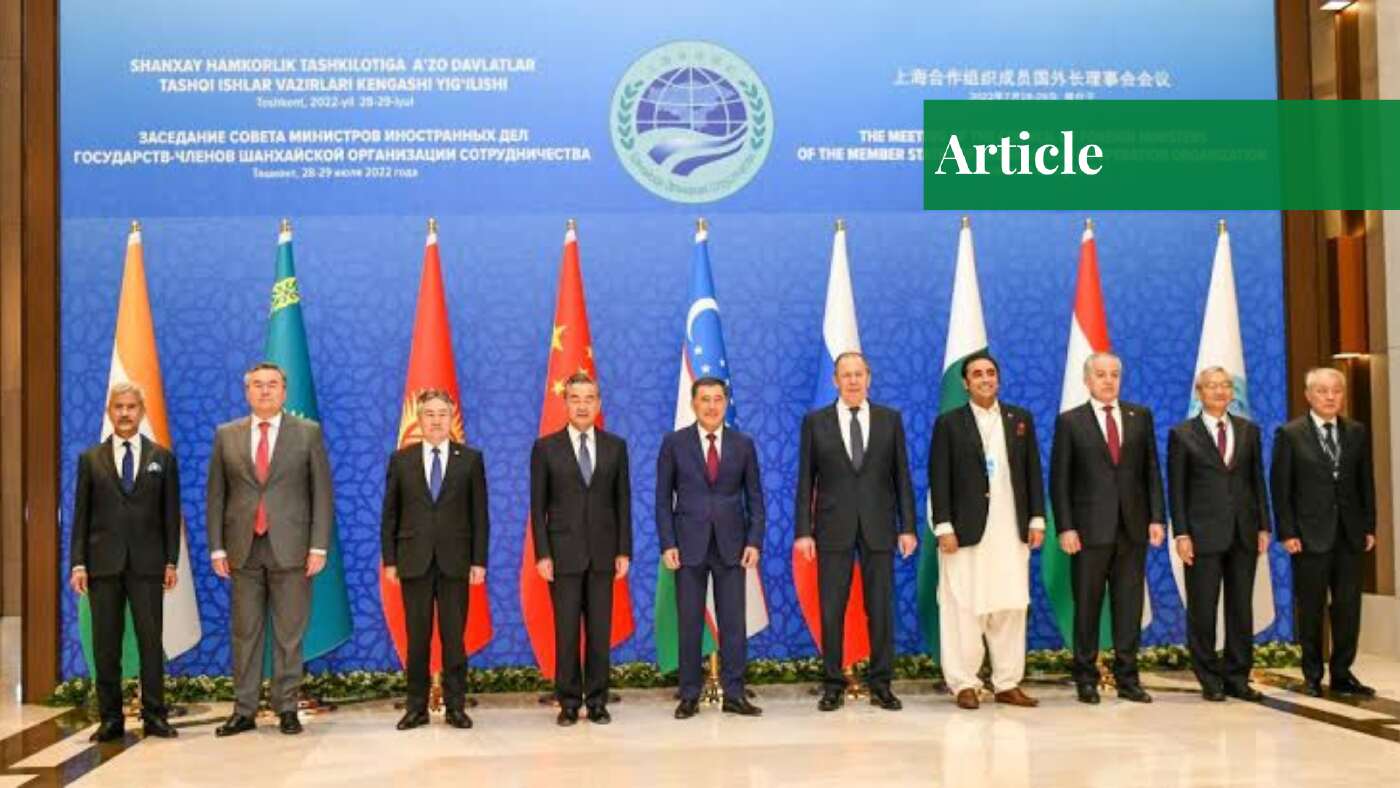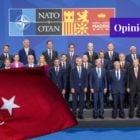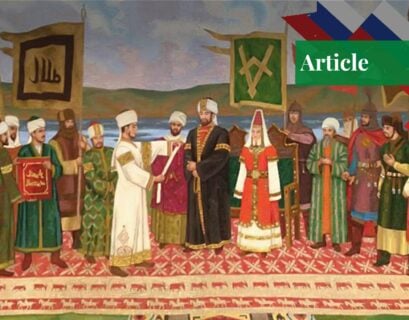The SCO Meeting in Tashkent
On July 28, the meeting of the SCO Council of Foreign Ministers commenced in Tashkent and concluded on July 29. The foreign ministers from 8 member countries of the Shanghai Cooperation Organization (SCO) were a part of this meeting, which took place in the capital of Uzbekistan. The two-day meeting of the Council of Foreign Ministers involved several closed-door discussions and conferences, in which various issues regarding the SCO’s expansion, its vision, and future goals came under discussion.
The Shanghai Cooperation Organization is the world’s largest geopolitical organization which incorporates 8 member states, 4 observer states, and 6 dialogue partners. This Eurasian organization was founded back in 2001, in Shanghai, to bolster the political, economic, and military ties between the member states. Initially, it only had 6 member states i.e. China, Russia, Uzbekistan, Kazakhstan, Kyrgyzstan, and Tajikistan. However, after the inclusion of Pakistan and India in 2017, there are now 8 SCO member states.
The member states in SCO seek to establish effective cooperation across various key areas like politics, trade, economy, research, technology, education, energy, and tourism. The Head of the States Council, which comprises heads of the member states, is the supreme decision-making body at SCO. It meets once a year at the annual summit of the organization, where decisions on all important matters regarding the SCO are adopted and guidelines are formulated.
Moreover, the multilateral cooperation strategy is also devised, along with the identification of key priority areas, and discussion regarding the ways to resolve the important economic and cooperation issues among the members. The SCO holds several meetings at different levels, including the meeting of the Council of Foreign Ministers.
To lay the groundwork for the annual SCO Summit, the foreign ministers of the member states gathered in Tashkent. Chinese Foreign Minister Wang Yi, Russian Foreign Minister Sergey Lavrov, Indian Minister of External Affairs Subrahmanyam Jaishankar, and Foreign Minister of Pakistan Bilawal Bhutto Zardari were among the participants of the meeting.
The foreign ministers from all the member states of SCO were received by Shavkat Mirziyoyev, the president of Uzbekistan. The meeting provided the opportunity for the preparation of the SCO Heads of States Council meeting, which is scheduled to be held in Samarkand on September 15-16.
Approval of Documents
In the Tashkent meeting of the SCO Council of Foreign Ministers, the foreign ministers shared their views on various important matters and showed coordination in the formulation of several documents that had to be presented at the SCO’s September summit. In the meeting, sixteen decisions related to various areas of socio-economic cooperation among the member states were signed.
To enhance the cooperation between the member states, the Comprehensive Plan for Implementing the Samarkand Declaration on Long-Term Neighborly Relations, Friendship, and Cooperation was approved. Apart from the adoption of the draft of the Samarkand Declaration, a joint statement on strengthening the Biological Weapons Convention was also endorsed by the foreign ministers. Moreover, the drafts of various other documents like the program to encourage industrial cooperation, and the provisions for the honorable title of SCO’s goodwill ambassador were also finalized.
Issue of SCO’s Expansion
The expansion of SCO was one of the key issues discussed in the SCO Council of Foreign Ministers’ meeting. Since various countries have shown keen interest in acquiring the status of the member state, observer state, and SCO dialogue partner, the applications from these states were reviewed by the foreign ministers in the meeting in Tashkent. In this regard, the key development took place as the decision to grant Iran the status of a full SCO member state was adopted.
A memorandum on Iran’s commitments was planned to be signed at the Samarkand Summit. Moreover, the ministers also expressed interest in Belarus’ request for full SCO membership. A decision to grant the dialogue partner status to Egypt, Qatar, and Saudi Arabia in the September Summit was also made. Likewise, the requests from Bahrain and Maldives to gain dialogue partner status were also supported.
Apart from these, the support for signing memorandums of understanding with the other notable international organizations like the Arab League and the UNESCAP (United Nations Economic and Social Commission for Asia and the Pacific), and UNESCO (United Nations Educational, Scientific and Cultural Organization) was made.
These steps were taken to expand the Shanghai Cooperation Organization to encourage multilateral cooperation in diverse areas like security, trade and investment, transport, and the industrial sector. The purpose is to ensure regional security and the development of trade, industrial, and transport sectors at a wider level in the SCO space.
Other Key Developments
In the SCO Council of Foreign Ministers’ meeting in Tashkent, the current region and geo-political issues were also discussed. Furthermore, the ministers expressed their commitment to the “Shanghai Spirit,” which focuses on cooperation in multiple arenas like politics, economy, security, and culture, based on the principles of mutual trust, respect for diversity, and equality. The foreign ministers also expressed their views regarding the prospects and opportunities for increasing cooperation under the SCO and acknowledged the organization’s place in regional and international affairs.
In the meeting, concerns regarding the new challenges and threats to security by the means of the destructive role of information technology were also expressed. In this context, the role of propaganda and fabricated news also came under discussion. To counter the forces of the “three evils” i.e. terrorism, separatism, and religious extremism, the heads of the delegations expressed unity. They stressed the need for joint efforts to protect their territorial integrity and defend their sovereignty, along with strengthening friendly ties and mutual support.
Moreover, the reports on the activities of the Regional Anti-Terrorist Structure (RATS) of the Shanghai Cooperation Organization were also presented at the meeting. For economic cooperation, the ministers discussed the establishment of the SCO Development Bank. In short, the participants showed their willingness to deepen their ties and expand their partnership to play their part in resolving regional and global geopolitical issues, which could help in establishing a fair and equitable world order.
The Contributions of Pakistan
From Pakistan, a delegation headed by the country’s minister of foreign affairs, Bilawal Bhutto Zardari, attended the meeting of the SCO Council of Foreign Ministers. In his address to the Council of Foreign Ministers, he expressed his views on the various geopolitical and economic issues of regional and global significance. He observed that to combat the challenges of the post-COVID era, be it geopolitical ones or related to the economy, “shared prosperity” is vital as it could prove instrumental in bringing peace and stability, both regionally and globally.
The foreign minister also shared his views regarding the growth of SCO which could be attained by removing trade barriers among SCO countries and building a network of businessmen and entrepreneurs, hence, attaining greater connectivity in the region. The Pakistani foreign minister also expressed his concerns over the critical situation in Afghanistan, an observer state of SCO.
He stressed that the other states adopt joint approaches regarding the deteriorating humanitarian crisis and economic challenges prevalent in neighboring Afghanistan. The meeting of the Council of Foreign Ministers in Tashkent was of immense significance for Pakistan as it provided a forum to share its priorities regarding the vision of SCO. Moreover, Pakistan also contributed to the discussion of several issues that were to be addressed in the Council of Head of States meeting in September 2022.
If you want to submit your articles and/or research papers, please check the Submissions page.
The views and opinions expressed in this article/paper are the author’s own and do not necessarily reflect the editorial position of Paradigm Shift.


















